ACT 01
*end of september 2023 in bandra mumbai during ganesha charturthi, celebratory noises are all around.
sounds of people, fireworks, music, animals are heard within close proximity of a popular patisserie along turner road, west of bandra in mumbai-india*
*kantha bai- a 50 year old local and bitter woman, bothered by the noises from both the overwhelming tourists in her neighbors’ 203 Couchsurfing apartment as well as the festivities outside. *then storms upstairs*
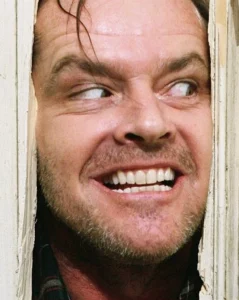
Director: Stanley Kubrick
KANTHA BAI: Aah! This noise! As if it wasn’t enough to have all the screaming outside, now we have to endure it on the inside too? Half the properties are overcrowded already. Why do they need more people? I am going over there! We live in a civilized world and they need to behave properly and not as animals! I don’t know what they did back in their country but this is India!
KANTHA BAI: Hey!! Open the door! We need to talk!! Open the door!! (fig 1)
*thump thump thump*
* kantha bai is hitting the door with passion*
* an innocent owner opens the door *
KANTHA BAI: This is all your fault! You and your little business. You are killing us!
MAYA : What? What is wrong ? And what are you killing? Except for this meal?
*Owner laughs while eating homemade food and holding a glass of wine*
OWNER: Guys this is my neighbor, Kantha Bai !
EVERYONE: Namaste!
KANTHA BAI: You loud annoying tourists ruin my beautiful city. Don’t you get that this is a residential area? You must keep it quiet! There are kids and families around here. It is certainly not a playground for you drunk tourists!

Devotees splash water on an idol of Hindu elephant god Ganesh, the deity of prosperity, as it is carried for immersion into the Arabian Sea on the last day of the Ganesh Chaturthi festival in Mumba
OWNER: Ignore her! She is just annoyed with all that noise from the festivities outside. (fig 2)
KANTHA BAI: Oh Wow!! You sir have some nerve! For you to just meet some girls, we all need to suffer. I am so fed up with you being so noisy all the time!
MAYA: Come on Ma’am! We’re having so much fun here. Sit, Taste the food, It’s amazing! We are all friends here, no one is paying.
(fig 3)
*kantha bai– grabbing a plate of food to try*
*neo stands up awkwardly living his half eaten food plate on the table*
*neo starts to leave – turns his head back*
NEO: This entire argument ruins my appetite. Housing should be a common resource rather than privately owned. As you should know – private property leads to economic inequality and class division. You (looking at the conservative-kantha bai) and you (looking at the owner) can afford multiple houses while others struggle to find a single place to stay.
*awkward silence*
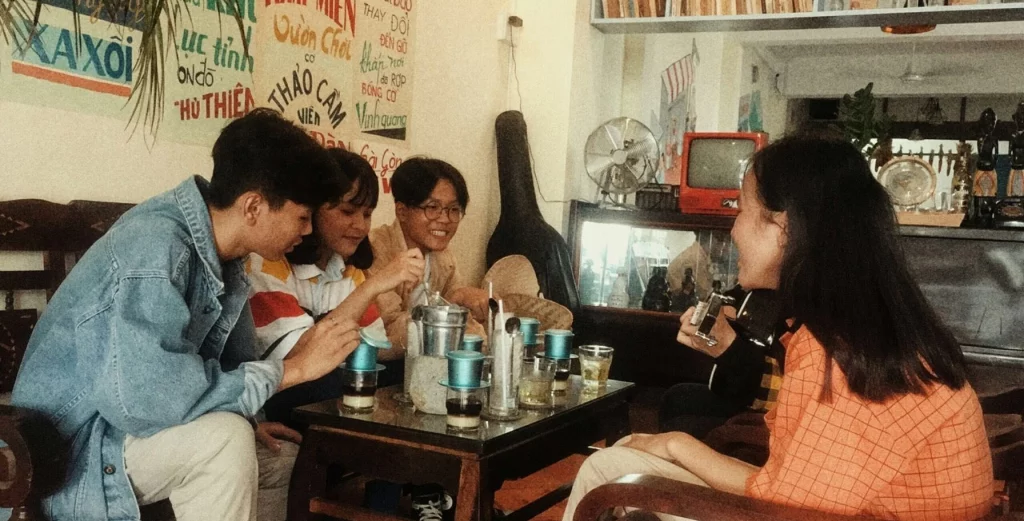
ACT 02
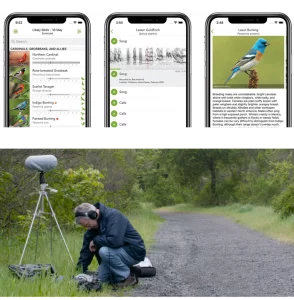
“The Singing Life of Birds: The Art and Science of Listening to Birdsong” by Donald Kroodsma.
This Is What Extinction Sounds Like, “Bernie Krause has spent a lifetime recording the sounds of nature. It’s getting quieter every day.”, May 2016
*the discussion is continuing frantically*
MAYA : I think we should go straight back to our animal instinct. A place shouldn’t be bounded strictly. Communal living with both animals and humans.
KANTHA BAI: Animal instinct? What do you mean? I think you had enough of that!
MAYA: (laughs) No. Well, I mean, appropriating instinctively – like birds. Do you know they “distinguish their territory by their singing? We are nothing more than a part of this ecosystem.”(1) (Fig 4)
NEO: Oh I knew “animals use sound to find mates but didn’t know they use it to mark their territory.”(2)
MAYA: Yes, They do! Sounds are an animal’s notion of power. “They use it to lure a mate, as wolves and whales. But you can be certain that they may use it for much more.”(3) Sound in particular has a lot of important qualities for all the species.
NEO: Since you mentioned it, I do wish that humans could understand such concepts and introduce them in our lives. By mimicking sound we can have properties belonging to every human being “as sound is for everyone, sound can not be owned, and sound can overlap and does not judge. Sound can not be divided and it can be distinguished for a far.”(4)
*silence as neo continues his rousing speech*
NEO: We need a peaceful world exactly like that, a world of people that can appropriate it and feel like home in every little piece of land. “Property and sound are the same abstract models created to aid humanity, not to divide it!”(5)
MAYA: Indeed fascinating! As birds do: “the idea of ownership somehow has no physical borders. Ownership is simply determined by time and sound not physical boundaries.”(6)The area they occupy and their physical presence is understood by the neighbors through sound. In a certain sense, this creates some kind of symbiotic living, you see? Fluid occupation. (Fig 5)
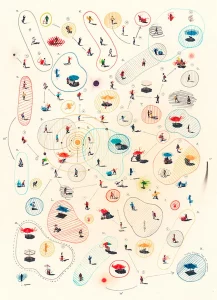
The work is based on a photographic record made in areas of the Pacific relevant for their migratory dynamics.
KANTHA BAI: What are you all talking about? I’m not a bird! “The right to own property is a human right. I should be able to peacefully enjoy my possessions”(7). “The labor of my body, and the work of my hands, are properly mine. Whatever I remove from nature, and have mixed with my labor, is my own.”(8)
NEO: Yes. But human beings who are not interested in things, in possession, do not submit to the ‘thing morality’, which is based on work and property. They prefer play to work, experiencing and enjoying rather than possessing.
OWNER: Come on Kantha! Chill a little! “We can all coexist in one big property! Our planet”(9)!
“One of the keys in music is harmony. This concerns the relationship between notes playing simultaneously”(10).As I understand, the same can be said about society. “With peaceful coexistence of people from different backgrounds. When they all respect and embrace each other.”(11) As different musical notes can together make a masterpiece! (Fig 6)
NEO: *while raising his glass* Perfect comrade! (Fig 7)

Director: Baz Luhrmann
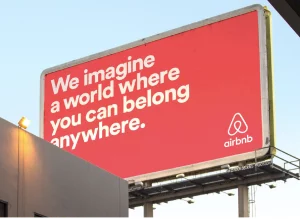
MAYA: Well. I believe this is a single-sided interpretation. Mrs. Kantha is agitated due to this overlap! Sometimes certain sounds conflict. “Can you co-exist with creatures that constantly interrupt your attempts to compose a harmonious set of tunes?”(12) Like a dog barking aggressively as you work.
KANTHA BAI: Not only that. Actually, “society simply does not work like a chain of production anymore. Most people are not defined by being either a producer or an oppressor. Economy today is based on services rather than production”(13). That’s why – today – property is so important for people to store their accumulated wealth.
MAYA: But Mrs. Kantha, you seem to support a kind of possessiveness that is a problem in the world at the moment. If I am not mistaken the “model of modern property only suits the humans. If we consider temporality, can each one of us not occupy a space at different times?”(14)
NEO: Besides the networking. As you said it: the “economy indeed is much more centered around services rather than producing. Id argue that owning property means less, not more”(15), today. Look at Uber, AirBnB and Cabify if you want an example. (Fig 8) Just like a song - you had it, you used it, it served you and, once you dont need it anymore, you just let go of it.
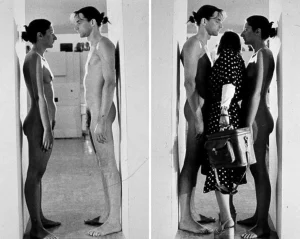
When Marina Abramovi? and Ulay walked from opposite ends of The Great Wall of China in 1988 to finish their 12-year romantic relationship, it was also the nail in the coffin of their collaborative and artistic partnership.
KANTHA BAI: It is very easy to point at me while you don’t consider the consequences of what you say. “The model of property exists exactly to divide society. If not, why do we consider them private or public? Why do we fence and lock them? Property is an idea developed so that we can define what is owned by us and what is not”(16). If we could manipulate sound as easily as we manipulate land or private property, why wouldn’t we make it the same as we did with those things?
OWNER: My friend, property is precisely the deterritorialized relation between human beings and the land. We’re not saying that we would not commercialize and corrupt the very notion of sound. Hell! Music is now an industry rather than art! What I am trying to say is: Open your mind a little!
points at neo
OWNER: Think about our nomad friend here. “Deterritorialization is what constitutes his relation to the earth, to such a degree that he reterritorializes on deterritorialization”(17). It is the earth that deterritorialized itself, in a way that provides the nomad with a territory. For example when Marina Abramovic and Ulay remained standing, naked, facing each other, at each side of the door that gave access to a Community Gallery. Space properties change dynamically as someone is passing between them. Do you see the shifts of space properties with just a simple act?” (18) (Fig 9)
an angry kantha bai walks out aggressively attempting to leave and knocks over a communal glass table on her way out (Fig 10)
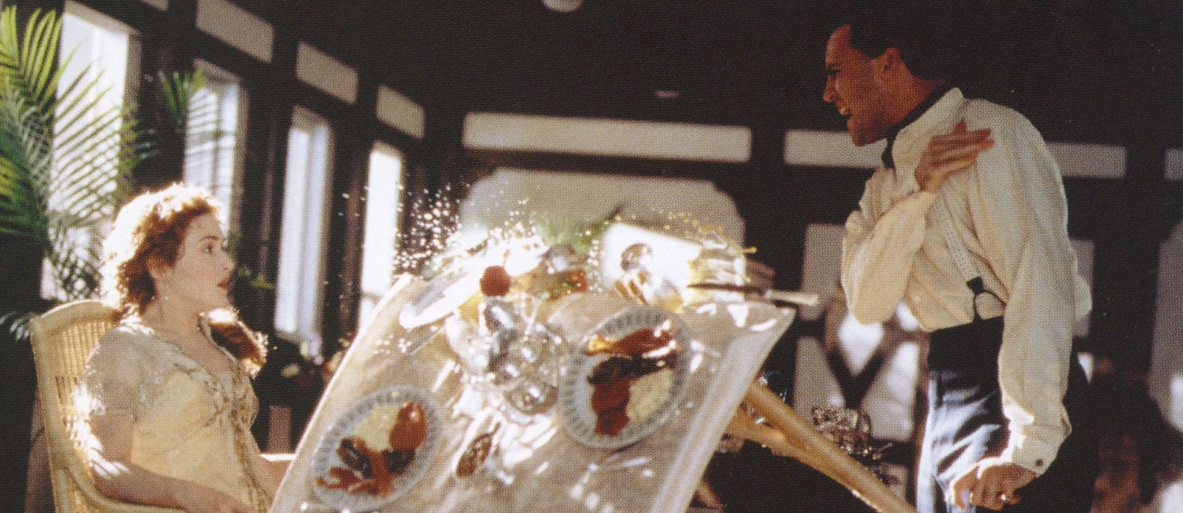
Director: James Cameron.
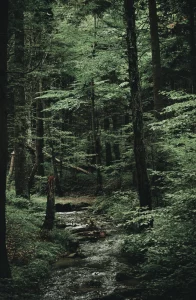
*crash*
OWNER :Are you ok?
*everyone gets up anxiously to check on her*
KANTHA BAI: You were all talking about this place as your own. You all live and coexist peacefully in this room, owning every single part of this house, right? Well then as it is all yours. (Fig11)
*she raises her hands and points to the ones living in the apartament*
KANTHA BAI: Then who will pay for the furniture?
*shock*
*everyone simultaneously trying to justify themselves*
OWNER: You misunderstood me; you see?…
NEO: There is a difference between philosophical beliefs and the real world..
NEO: Oh hell!
MAYA : I guess I forgot my wallet….
*awkward*
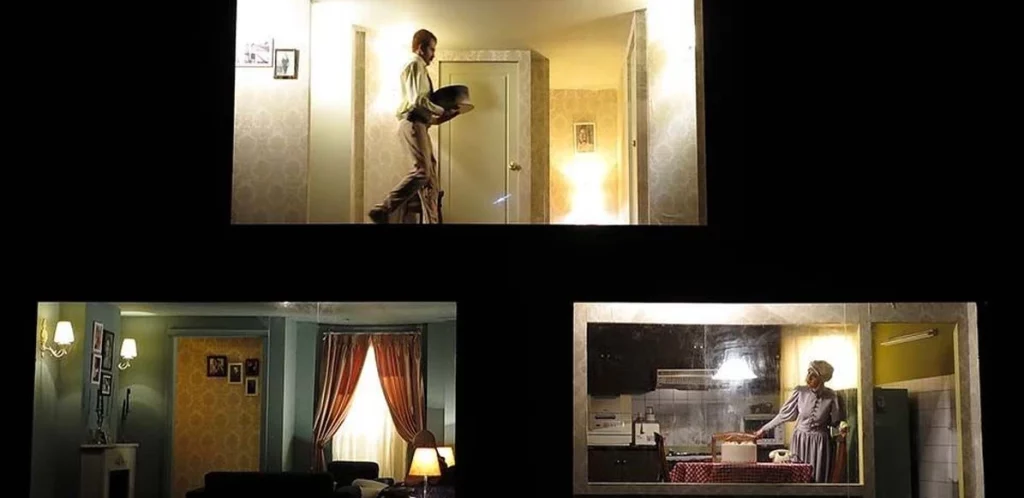
EPILOGUE
*in this quiet evening the owner is lighting his cigar in the communal space*(Fig 13)
*catching them in the middle of their conversation*
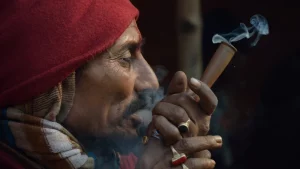
MAYA: I would like you to consider the work of Gokce Kinayoglu and his idea of placemaking. You see, when we rely solely on visuals we tend to lean towards physical boundaries. This idea of “I can see a wall so it means I cannot go beyond”. Let’s consider the harmonious relationship between a lightning stroke and the thunder that comes after it. Did you know that you can tell how far a lightning strike is just by waiting to hear the sound of thunder?
NEO: This entirety does not necessarily rely on physical borders but, light, time and sound, it’s a co-existence of 3 entirely different entities.
MAYA: Can you “imagine living in a world only bounded by invisible borders?”(19) A good example would be a garden. I occupy it in the morning, however in the afternoons by listening to the sound of bees, I temporarily unoccupied it, allowing it to be a space for bees as they collect nectar and pollinate my growing plants. Maybe it wouldn’t make sense at that point in time but it would only be understood when my flowers bloom in spring.
NEO: Yes indeed! Softwares used to be one time payment, owning it forever but nowadays all the digital tools are subscription based, never fully owning them. “The whole world is moving towards a digital-twin version of it, when you even can have digital properties”(20).
OWNER: However, paying everything again and again… Are we considering everything to be property nowadays? “Even the things we can never touch or be there? Is really everything this fluidic as we are imagining it to be?”(21)
NEO: Why are we debating “physical boundaries when we have the capability to virtually create and customize our own spaces according to our preferences?”(22)
OWNER: You know what guys, I really don’t care about any of this, as long as you all PAY ME FOR THE TABLE !
*all start to laugh*
CURTAIN
Bibliography
Living Soundscapes , The Bartlett School of Architecture , Number of the student: 22200435
“The Singing Ape: Understanding the Origins of Human Speech” by Marc D. Hauser:
“The Singing Life of Birds: The Art and Science of Listening to Birdsong” by Donald Kroodsma.
“The World in Six Songs: How the Musical Brain Created Human Nature” by Daniel Levitin.
“Common as Air: Revolution, Art, and Ownership” by Lewis Hyde.
“The Secret Wisdom of Nature: Trees, Animals, and the Extraordinary Balance of All Living Things” by Peter Wohlleben.
Universal UN Declaration, Right to Property & Ownership, Videos : United for Human Rights, Right to property – Wikipedia, Berle, Adolph A. (1965). “Property, Production and Revolution”
Second treatise of Government by John Locke, Chapter 5
“The World Without Us” by Alan Weisman.
“Harmony in Design: A Synthesis of Literature from Classical Philosophy, the Sciences, Economics, and Design”. She Ji: The Journal of Design, Economics, and Innovation
“The Tao of Music: Sound Psychology” by John M. Ortiz.
“The Tragedy of the Commons” by Garrett Hardin.
“Capital in the Twenty-First Century” by Thomas Piketty.
“The Tragedy of the Commons” by Garrett Hardin.
“What’s Mine Is Yours: The Rise of Collaborative Consumption” by Rachel Botsman and Roo Rogers.
“The Conquest of Bread” by Peter Kropotkin.
“A Thousand Plateaus: Capitalism and Schizophrenia” by Gilles Deleuze and Félix Guattari.
“The Performance Art Of Marina Abramovic as a Transformational Experience” by Lilia Simons, Maria Consuelo Passos
“The Spell of the Sensuous: Perception and Language in a More-Than-Human World” by David Abram.
“Who Owns the Future?” by Jaron Lanier.
“The Age of Em: Work, Love, and Life when Robots Rule the Earth” by Robin Hanson.
“Hamlet on the Holodeck: The Future of Narrative in Cyberspace” by Janet H. Murray.
References
1-Living Soundscapes , The Bartlett School of Architecture , Number of the student: 22200435.
2-“The Singing Ape: Understanding the Origins of Human Speech” by Marc D. Hauser.
3-“The Singing Life of Birds: The Art and Science of Listening to Birdsong” by Donald Kroodsma.
4-“The World in Six Songs: How the Musical Brain Created Human Nature” by Daniel Levitin.
5-“Common as Air: Revolution, Art, and Ownership” by Lewis Hyde.
6-“The Secret Wisdom of Nature: Trees, Animals, and the Extraordinary Balance of All Living Things” by Peter Wohlleben.
7-Universal UN Declaration, Right to Property & Ownership, Videos : United for Human Rights, Right to property – Wikipedia, Berle, Adolph A. (1965). “Property, Production and Revolution”.
8-Second treatise of Government by John Locke, Chapter 5.
9-“The World Without Us” by Alan Weisman.
10-“Harmony in Design: A Synthesis of Literature from Classical Philosophy, the Sciences, Economics, and Design”. She Ji: The Journal of Design, Economics, and Innovation.
11-“The Tao of Music: Sound Psychology” by John M. Ortiz
12-“The Tragedy of the Commons” by Garrett Hardin.
13-“Capital in the Twenty-First Century” by Thomas Piketty.
14-“The Tragedy of the Commons” by Garrett Hardin.
15-“What’s Mine Is Yours: The Rise of Collaborative Consumption” by Rachel Botsman and Roo Rogers.
16-“The Conquest of Bread” by Peter Kropotkin.
17-“A Thousand Plateaus: Capitalism and Schizophrenia” by Gilles Deleuze and Félix Guattari.
18-“The Performance Art Of Marina Abramovic as a Transformational Experience” by Lilia Simons, Maria Consuelo Passos
19-“The Spell of the Sensuous: Perception and Language in a More-Than-Human World” by David Abram.
20-“Who Owns the Future?” by Jaron Lanier.
21-“The Age of Em: Work, Love, and Life when Robots Rule the Earth” by Robin Hanson.
22-“Hamlet on the Holodeck: The Future of Narrative in Cyberspace” by Janet H. Murray.

